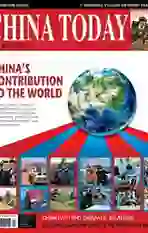Chinese Soft Power: Is There Such a Thing?
2015-08-26BystaffreporterCHRISTOPHETRONTIN
By+staff+reporter+CHRISTOPHE+TRONTIN
Will China be the dominant superpower of the 21st century?
Some believe this to be a given. But the fact is that two schools of thought are seriously debating this question, in the U.S. and elsewhere. The members of school A say that Chinas GDP has overtaken that of the U.S. in purchasing power parity, and that it will surpass the U.S. in nominal terms around 2030. China, therefore, with its modernized army, nuclear deterrent, and permanent seat on the UN Security Council will without doubt challenge U.S. supremacy over world affairs, just as the USSR did in its time. To this, school B retorts that, while this is all very likely, the point is that the USSR never was in a position to conquer the world.
Becoming a superpower is not merely a question of armed forces and economic weight. The third mandatory element is that of ideological clout; the capacity of a country to formulate its ideology and impose it upon other countries as their own.
Harvard professor Joseph Nye was the first to coin the phrase “soft power” in a 1990 article that later became a book. He defined it as the power the U.S. had developed to seduce world opinion in order to put pressure on foreign leaders and force foreign countries to act according to U.S. needs. Although generally without violence (thats the point of the adjective “soft”), the existence of military and economic power to back up open or covert coercion (embargo, invasion, funding of separatist movements, street protests, etc.), can of course add a certain amount of weight to verbal arguments.
Nye is right insofar as the U.S. is the only major “soft superpower” while Chinas soft power is much weaker and works only at home. Their respective soft powers can be compared to the dollar and the yuan: while the former is ac-cepted worldwide, the latter is not freely convertible.
The dollar exception, in that unlike other national currencies it can be printed in unlimited quantities, is a key aspect of the soft power mechanism. Soft power relies largely on financial perks that the dominating power grants to those it dominates, to compensate for their loss of sovereignty. It, therefore, requires a huge budget. Thanks to the dollars safe haven status, the greenback funds the American military might, which in turn reinforces the dollars fiduciary value, and so on. The U.S. deficit thus provides for the countrys quasi-monopolistic cultural domination through globalized cinema, media, and the Internet.endprint
Thanks to its trade surplus, China has amassed a significant financial reserve, large enough to start competing with its world rival. Moreover, unlike the rest of the world, China has been careful to preserve some form of “cyber-sovereignty.”The world has unconditionally embraced the Facebook, Twitter, and Google way of life, only to discover that they are recreational interfaces for the NSA. China, through selective Internet protectionism, paved the way for the creation of national champions able to resist, at least in the domestic market, U.S. cyberimperialism.
However, the Chinese soft power potential is not being exploited to the full. Two specialists in Chinese soft power, Bates Gill and Yanzhong Huang, doubt that China can use it as a tool to promote its foreign policy goals. In their 2006 paper, Sources and Limits of Chinese Soft Power, they explained, “Examination of Chinas soft power resources in the areas of culture, political values, and diplomacy shows that, while Chinas soft power is increasing, Beijing faces serious constraints in translating these resources into desired foreign policy outcomes.”
China Has the Means. But Does It Have the Ambition?
In a recent speech in Beijing to Tsinghua students, Joseph Nye stated that China has been trying for a decade or so to develop its soft power. Former president Hu Jintao made this the central aim of his policies: opening hundreds of Confucius Institutes in foreign countries; opening Chinese universities to hundreds of thousands of foreign students; and displays of international prestige(space conquests, the Beijing Olympics, Shanghai Expo 2010). Surprisingly, other even more important elements were not mentioned: like the diplomatic effort whose aim was to resolve persistent, nagging border issues that clouded regional peace. Recently, 17 of these disputes, with such countries as Russia and Vietnam, were officially settled. Only six remain.
The charm offensive continues under the Xi presidency: The fight against corruption, the fight against pollution, and bilateral and multilateral initiatives will slowly but surely help polish Chinas world image.
Audio-visual media also play a role. With 30,000 hours of soap operas produced per year, China has become a world leader in that field. Chinese romantic comedies are now selling internationally, especially in Africa, where they are praised for their reasonable price.endprint
China invests in cinema too, especially in movies that can help popularize Chinese culture and history, like the biopic Confucius (directed by Hu Mei, 2010) and The Founding of the Republic (directed by Huang Jianxin, 2009). Observing the lackluster success of purely Chinese movies in foreign countries, China launched international coproductions to widen the international access of its movies, like, for example, Wolf Totem, co-produced with French director Jean-Jacques Annaud in 2014.
Promoting a Comprehensive Worldview
But these initiatives are not powerful enough to compete with American soft power: as long as China is aping American recipes rather than projecting its own worldview, it will always follow behind the second-tier power. To earn superpower status, China needs to create and promote a comprehensive ideology that will offer an alternative to the existing American model.
Soft power is not about facts, but rather about their interpretation. This is why the world still accepts the incredible contradiction we currently live in: the current superpower starts multiple wars all over the globe, sponsors terror groups it later vows to fight, engages in illegal activities at home and abroad (cyberspying, secret prisons, covert overthrow-ing of foreign leaders, kidnapping and torture of suspects, drone attacks, etc.), yet remains leader of the free world. After 2001, the world accepted without demur the notion that the U.S. is no longer bound by international law or the Geneva conventions, which remain compulsory for every other country. Since WikiLeaks and the Snowden episode, we know that U.S. intelligence agencies do not abide by national legislation either. This knowledge bizarrely coexists with the notion of Uncle Sam as the worlds cop.
Its almost the exact contrary for China. Never mind its scrupulous observation of international law, low profile, and cooperation policies on the world stage, the free press coverage of China brims with critique and suspicion. In foreign media the word “China” is generally associated with such notions as“neo-colonialism (in Africa),” “currency manipulation,” “protectionism,” “imperialism,” and “corruption.” Democratic media seem intent on trying China on charges that should be brought against the U.S.
The reason why is that the U.S.s mediatic domination is quasi-monopolistic. And like any other monopoly, this one is fighting for its privilege by fiercely eradicating any possible competition. Be it the “Chinese propaganda” or conspiracy theories, any expression of a non-American view is branded anti-American. In order to convince the world of the validity of its views and recipes, China must deliver tangible economic results. Its model of bilateral cooperation without political involvement in Africa is starting to bear fruit. More recently, a similar policy was launched in Eastern Europe, and a similar logic is behind the Belt and Road Initiatives in Central Asia.endprint
Foreign investment can contribute to improving the countrys image. As Sameh El-Shahat, director of China-i Ltd., puts it, “Since foreign governments change often, ties must be woven with the peoples of these countries.” A good example can be seen in Greece, the country where Chinese FDI is the highest in per-capita terms. According to a PEW Research Center study published in 2012, Greece is the only country in the EU where public opinion on China is largely favorable (56 percent positive views, compared to only 35 percent for the U.S.). The tide of negative opinions seems also to be turning in Britain, incidentally, the largest beneficiary of Chinese investment in Europe.
Towards Peaceful Bipolarity?
A recent example of a Chinese soft power breakthrough was the successful launch of the Asian Infrastructure Investment Bank (AIIB). Around 50 countries, including Germany, France, and Britain, jumped on the bandwagon, much to the chagrin of U.S. officials who would prefer to see their allies circling wagons around traditional (Westerndominated) facilities such as the IMF, World Bank, and Asian Development Bank. “Americas ‘international credibility and influence is under threat as China sets up rivals to the International Monetary Fund and World Bank and draws the support of long-time U.S. allies,” said U.S. Treasury Secretary Jack Lew. Gaining some leverage over world affairs and freeing themselves from the sometimes oppressive influence of Washington is exactly what motivates many of the founding member states. India, Russia, and others see in the AIIB a facility where their projects stand a chance of being funded, having been rejected by Western-controlled vehicles such as the IMF or Asian Development Bank.
According to Bates Gill, Central Asia and Africa are looking for development solutions in Beijing rather than in Washington. Indian former prime minister Manmohan Singh lauded China as its economic development role model, while former Brazilian president Lula sent his economic advisers to Beijing to study the Chinese example.
Public opinion seems to be shifting, too. According to the yearly BBC/Globescan poll conducted in 21 countries, the balance of positive versus negative public opinion on the role of China remains fairly negative in the U.S. and in Western Europe, but China is seen as a positive force in most of Africa, a continent where it has invested massively.
Joseph Nye can only think in terms of“returns on investment” and so regards Chinas ambitious project to promote the Chinese Dream throughout the world as a manifest failure. But although Chinas international policy appears fragmented, it in fact forms a constituent part of a global strategy.endprint
These are merely preparatory skirmishes. Establishing a comprehensive ideological brand able to win hearts and minds cannot be a quick process. “Ideas take a long time to penetrate the soul of the crowd, and take equally long to leave. This is why public opinion always lags several generations behind, in terms of ideas, researchers and philosophers,”said Gustave Le Bon in The Crowd: A Study of the Popular Mind.
China seems headed at a leisurely pace towards a “harmonious bipolarity.”Contrary to the USSR during the Cold War, China has not produced a radically alternative ideology and does not try to convert others to the model it has chosen for itself. In contrast to the U.S., China does not try to topple foreign governments or invade foreign countries, and neither does it impose economic sanctions or embargoes on uncooperative countries.
This fact seems to be gaining gradual acknowledgement. According to a 2013 Gallup poll conducted in 65 countries on 64,000 respondents, the world population largely sees the U.S., not China, as the major threat to world peace. This is a very slow evolution given the obviousness of the fact.
Convincing the rest of the world that it has no hegemonic ambitions is Chinas next soft power challenge. The one following should be to show, through concrete examples, that the advantages of a close economic cooperation easily outweigh ideological differences. Will it succeed? History has shown that longterm effort towards a distant goal is one of the countrys strong suits.endprint
